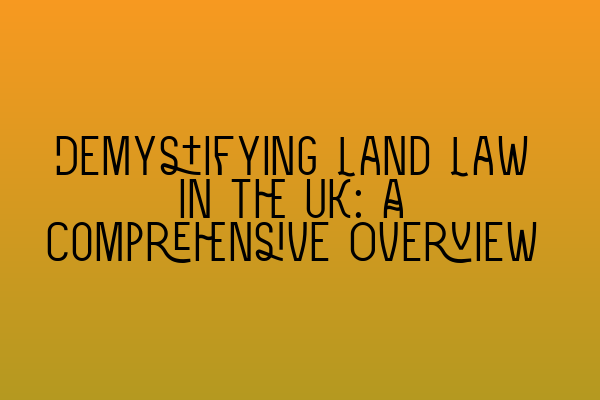Demystifying Land Law in the UK: A Comprehensive Overview
Are you looking to gain a deeper understanding of land law in the UK? Look no further! In this comprehensive overview, we will demystify the complex world of land law and provide you with valuable insights into its various aspects. Whether you are a property owner, aspiring solicitor, or simply curious about the subject, this article aims to equip you with the knowledge you need to navigate the fascinating realm of land law.
Understanding land law is essential for anyone dealing with property transactions, disputes, or development projects. It is a multifaceted field that encompasses a wide range of legal principles and concepts. To fully comprehend land law, it is crucial to explore its key components: property rights, legal estates, and interests, as well as the intricacies of property registration and ownership.
Property Rights:
Property rights lie at the core of land law. They define the legal relationships between individuals and the land they own or occupy. In the UK, property rights are primarily governed by legislation such as the Land Registration Act 2002 and the Law of Property Act 1925. These laws establish the rights and obligations related to property ownership, use, and transfer.
The concept of property rights can be classified into two broad categories: freehold and leasehold. Freehold refers to absolute ownership of land, while leasehold involves a temporary right to use and occupy land, usually granted through a lease agreement. Understanding the differences between these two types of property rights is crucial for individuals involved in property transactions or disputes.
Legal Estates and Interests:
Legal estates and interests refer to the different ways individuals can have rights over land. These rights may include possession, ownership, or the right to use certain areas of land. The most common types of legal estates in the UK are fee simple absolute, fee simple conditional, and life estate. Each of these estates grants varying degrees of ownership and control over the land.
In addition to legal estates, land law recognizes various interests that can exist alongside ownership. These interests include easements, restrictive covenants, and mortgages. Easements are rights that allow individuals to use or access another person’s land for a specific purpose, such as a right of way or a right to light. Restrictive covenants, on the other hand, impose certain restrictions on land use. Mortgages serve as security for loans and grants lenders the right to repossess the property if the borrower defaults.
Property Registration and Ownership:
Property registration plays a crucial role in land law as it provides an official record of the ownership and interests associated with a particular property. The Land Registry is responsible for maintaining these records in England and Wales, ensuring transparency, and facilitating property transactions.
When acquiring or selling a property, it is vital to conduct a thorough search of the Land Registry to confirm ownership and any interests or rights that may affect the property. This search helps prevent future disputes or unexpected liabilities. Understanding the process of property registration, including land transfer, charges, and leases, is essential for anyone involved in property transactions.
Conclusion:
The world of land law may initially appear daunting and complex, but with the right knowledge and understanding, it becomes a fascinating subject to explore. In this comprehensive overview, we have delved into the crucial components of land law, including property rights, legal estates, interests, and property registration. Armed with this knowledge, you can confidently navigate the intricacies of land law and make informed decisions regarding property transactions or disputes.
If you are interested in further expanding your legal knowledge, we recommend exploring these related articles:
– Understanding Contractual Capacity: Rights and Limitations
– Interactive SQE Mock Tests for Contract Law: Test Your Knowledge
– Join Our SQE Contract Law Webinars: Expert Insights and Guidance
– Contractual Capacity: Understanding Legal Competence in Contracting Parties
– Contract Law Reforms: An Analysis of Recent Changes
These articles cover a wide range of legal topics that can further enhance your understanding of property law in the UK.
Remember, navigating land law can be complex, and seeking the guidance of legal professionals, such as the solicitors at SQE Property Law & Land Law, is highly recommended. With their expertise and experience, they can provide tailored advice and support tailored to your specific needs.
In conclusion, by embracing the fundamental principles of land law and continuously expanding your knowledge, you can confidently navigate the legal intricacies associated with property ownership, transactions, and development in the UK.
